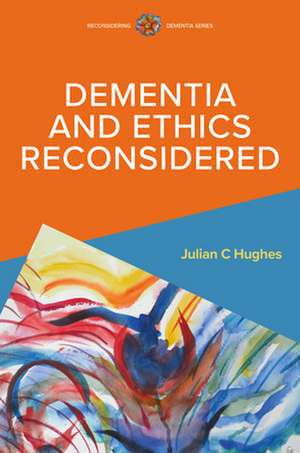Dementia and Ethics Reconsidered
Autor Julian Hughesen Limba Engleză Paperback – 30 mai 2023
Tom Dening, Professor of Dementia Research, School of Medicine, University of Nottingham, UK
“This book is totally brilliant. The outstanding author Dr. Julian Hughes must now be considered the foremost ethicist of his generation when it comes to caring for individuals with dementia … This is now the book that everyone who cares about dementia and ethics must read, discuss, and implement. It is a huge contribution.”
Stephen G. Post PhD, Director, Center for Medical Humanities, Compassionate Care & Bioethics
Stony Brook University School of Medicine, USA
“This book should be an essential read for all of us who support and navigate the ethical issues relating to people with dementia and their families.”
Paul Edwards, Director of Clinical Services, Dementia UK
Ethical issues are involved in every decision that is made in connection with someone living with dementia – from decisions about care and treatment to decisions about research and funding.
This book encourages the reader to reconsider ethics in dementia care with the use of ‘patterns of practice’, an innovative idea developed by the author. The book highlights the importance of understanding the person’s narrative, of good communication, high quality care, and expert interpretation of the meaning of situations for people living with dementia. This book:
• Reviews ethical theories and approaches in connection with dementia care
• Considers issues such as such as stigma, quality of life, personhood, and citizenship in relation to dementia
• Looks at issues relevant to research ethics
• Presents case vignettes to highlight a complete spectrum of ethical issues that arise in dementia care
• Is accessibly written for multiple audiences – from people living with dementia to practitioners
Dementia and Ethics Reconsidered is a comprehensive account of thought and practice in relation to ethical issues that arise in the context of dementia care, which seeks to show how ethical thinking can be put into practice and prove relevant to day-to-day experience.
The Reconsidering Dementia Series is an interdisciplinary series published by Open University Press that covers contemporary issues to challenge and engage readers in thinking deeply about the topic. The dementia fi eld has developed rapidly in its scope and practice over the past ten years and books in this series will unpack not only what this means for the student, academic and practitioner, but also for all those affected by dementia.
Series Editors: Dr Keith Oliver and Professor Dawn Brooker MBE.
Julian C. Hughes was a consultant in old age psychiatry. Having trained in both philosophy and medicine, he was appointed honorary professor of philosophy of ageing at Newcastle University, UK and subsequently professor of old age psychiatry at the University of Bristol, UK. He was deputy chair of the Nuffield Council on Bioethics, UK.
Preț: 200.27 lei
Nou
Puncte Express: 300
Preț estimativ în valută:
38.32€ • 40.20$ • 31.90£
38.32€ • 40.20$ • 31.90£
Carte disponibilă
Livrare economică 11-25 martie
Livrare express 25 februarie-01 martie pentru 26.03 lei
Preluare comenzi: 021 569.72.76
Specificații
ISBN-13: 9780335251001
ISBN-10: 0335251005
Pagini: 312
Dimensiuni: 150 x 230 x 17 mm
Greutate: 0.42 kg
Editura: McGraw Hill Education
Colecția Open University Press
Locul publicării:United Kingdom
ISBN-10: 0335251005
Pagini: 312
Dimensiuni: 150 x 230 x 17 mm
Greutate: 0.42 kg
Editura: McGraw Hill Education
Colecția Open University Press
Locul publicării:United Kingdom
Cuprins
Part 1. Theory and Everyday Life
1. Introduction: In anticipation – so what?
2. The “problem” of ethics
3. Ethical theories: Viva las virtudes!
4. Ethical approaches
5. Practical approaches: casuistry and values-based practice
6. An idea: patterns of practice
Part 2. Notions of Note
7. Stigma and resources
8. From autonomy to relational autonomy
9. From paternalism to solicitude
10. Dignity
11. Capacity and consent
12. Best interests
13. Personhood and citizenship
Part 3. Ethical research and principles
14. Dementia and ethics research
15. The Nuffield Council’s report
16. Research ethics, biomarkers and genetics
Part 4. Dilemmas in Practice
17. Diagnosis
18. Maintaining independence
19. Technology
20. Abuse
21. Accepting care
22. Behaviour
23. Forced care
24. Medication
25. Sexuality and intimacy
26. Truth-telling
27. Hospital admission
28. Food and drink
29. Antibiotics and infections
30. Ethics in the time of a pandemic
31. Resuscitation
32. Death and dying
Part 5. Conclusion
33. Putting it all together – patterns of practice
34. So what?
1. Introduction: In anticipation – so what?
2. The “problem” of ethics
3. Ethical theories: Viva las virtudes!
4. Ethical approaches
5. Practical approaches: casuistry and values-based practice
6. An idea: patterns of practice
Part 2. Notions of Note
7. Stigma and resources
8. From autonomy to relational autonomy
9. From paternalism to solicitude
10. Dignity
11. Capacity and consent
12. Best interests
13. Personhood and citizenship
Part 3. Ethical research and principles
14. Dementia and ethics research
15. The Nuffield Council’s report
16. Research ethics, biomarkers and genetics
Part 4. Dilemmas in Practice
17. Diagnosis
18. Maintaining independence
19. Technology
20. Abuse
21. Accepting care
22. Behaviour
23. Forced care
24. Medication
25. Sexuality and intimacy
26. Truth-telling
27. Hospital admission
28. Food and drink
29. Antibiotics and infections
30. Ethics in the time of a pandemic
31. Resuscitation
32. Death and dying
Part 5. Conclusion
33. Putting it all together – patterns of practice
34. So what?
